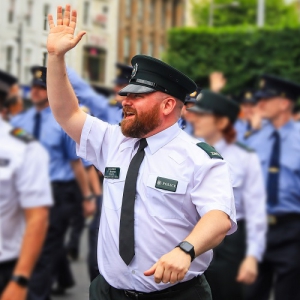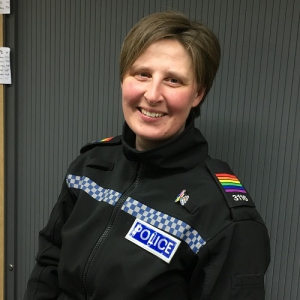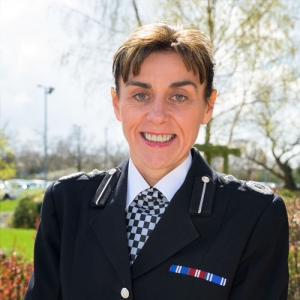After an extremely challenging year for many of us, this year’s LGBTHM seems more poignant than ever. I have taken time to reflect on the many blogs, articles and social media posts which have been shared by colleagues and our LGBT+ communities. I have done this with the backdrop of It’s a Sin and the memories that has evoked in many, myself included. If I am honest, this month alongside that TV series, has spurred me on to do more and make more progress.
I have remained connected, via our National Police LGBT+ network, with local networks to ensure we are there for each other. I have been so aware of the isolation, the lack of LGBT+ community events, no Pride season, people/colleagues living in anti-trans or homophobic, biphobic homes or relationships during Covid and the impact this has had on so many.
I am the National Police Chiefs’ lead for LGBT+ and I am a proud ally for my LGBT+ Police colleagues. I have had this role now for 4 years and I volunteered to do it because I want inclusion for all within policing and within society. My focus is LGBT+ as that is the portfolio I lead on; and we have other leads for race, religion and belief; gender; disability; age; gypsy Roma & Traveller and many other aspects of policing. We are all working towards a much more representative and inclusive policing organisation. This is vital and a key Peelian principle, we are the public and the public are the Police.
When challenged about the work I do around LGBT+, be it on social media or otherwise, I reassure myself that no I am not virtue signalling, (meaning that I do this work to try to show others that I am a good person….. and want to say things that will be accepted by others.). I am doing the right thing for the right reasons. This is to ensure we work within the Equality Act, that we deliver on our public sector duty and that I do all I can to ensure every single Lesbian, Gay, Bisexual, Transgender, Intersex and Non-Binary colleague, can come to work each day knowing they can be themselves.
I wanted to reflect on why we have LGBT+ History Month (LGBTHM). The event came in the wake of the abolition of Section 28 (of the Local Government Act 1988) in 2003, which stated that a local authority “shall not intentionally promote homosexuality or publish material with the intention of promoting homosexuality” or “promote the teaching in any maintained school of the acceptability of homosexuality as a pretended family relationship’. This meant that LGBT+ teachers and pupils were not allowed to be open about who they were and conversations could not take place. Only a couple of days ago I heard a non-binary police officer talking about going to school under S28 – ‘6 years of bullying…my life was utter hell’ – and no one could stand by them and support them. This was following on from the extremely homophobic AIDS epidemic and at a time when LGBT+ people still could not marry or adopt, nor did they have protection in some basic laws.
As the National Police Chiefs’ lead for LGBT+, it is a time to consider where are we now with LGBT+ inclusion within policing and take a look at the battles that have taken place over the years purely for LGBT+ people to be accepted. I looked on the LGBTHM website which said ‘educate out prejudice and make LGBT+ people visible in all their rich diversity’. I find it incredible when I hear people being negative about someone simply because they are LGBT+, when it is so obvious just how much of a difference it makes to have a society and workforce that is made up of rich diversity. Difference makes such a big difference.
So what is it about our society that still makes people worried about telling others they’re LGBT+? Many people ask me why we still need to keep pushing LGBT+ inclusion as everything is fine these days. And yet when we hear of a top class sport person, TV celebrity or other well know person coming out as gay or bi or trans, it is newsworthy and surprising for people and still causes discussion and support, as well as negativity and hate. When did I come out as straight – well of course never? But it still remains a big thing for some people in the LGBT+ community to be able to honest about who they are.
I can walk down the street holding hands with my husband and no one bats an eye lid. When two women or two men walk down the street holding hands, then they may get looked at, pointed at, stared at, verbally abused or even physically attacked. And if you’re trans – you will be extra vigilant about being able to be you most days. The impact this can have on someone’s wellbeing is huge and we all have to be allies for each other, regardless of whether or not we are part of the LGBT+ community. These are our colleagues and friends and many are not afforded the same rights or privileges that non-LGBT+ people are. Human rights are not politics and my support of LGBT+ matters is about doing the right thing and making our workplaces welcoming and inclusive.
I am also told that I should get on with proper policing – lock up burglars, robbers, paedophiles etc. And of course we do that and I lead a force where my officers and staff are doing that on a daily basis. Those within LGBT+ networks and those running LGBT+ social media accounts, all have busy, full time jobs embracing many, many varied roles in policing. The work they do to progress LGBT+ equality is often done in their own time and with good will and intention.
The work I do is to ensure that we attract the very best into Policing, to encourage a wide diversity of officers and staff (our duty to be representative of our communities); that we are an inclusive organisation; that our staff can deliver their best by being able to be open about who they are (if they wish); and our communities are likely to get a better service because we educate our staff about all elements of society – including LGBT+.
So why am I writing this article? I want to continue to raise awareness that it’s still not always easy to be LGBT+ in policing. Many people will say – ‘why do we still need to march at Pride, why all the rainbows, aren’t we done with that now’? Well the answer is a deafening ‘No’. Although many of us know someone who is lesbian or gay and therefore have some sort of understanding, a lot of people have no understanding of being Bisexual (Bi) or Trans. I speak regularly to police colleagues who are lesbian, gay, bi, trans, non-binary, intersex; their experiences enrich me, they make me think differently and that can only be a good thing. I want to make sure that they get the support they need to feel valid about who they are and can feel confident in work.
Thankfully our workforce make up is changing. Trans colleagues are feeling more confident than ever to be themselves, there are supportive leaders, networks and teams out there. We still see however that all too often their identity is questioned, queried in a way many others are not. It is in my gift to ensure that we continue the dialogue, the conversations, the education and the awareness of trans matters.
People don’t choose to be trans, they are trans and they are trying to live the life to which they are entitled. I am working with many internal departments and areas of business to continue to update systems, working within the law to progress LGBT+ matters across the piece.
As I close this article I am delighted to see that the MoD is allowing former personnel discharged over their sexuality to have their medals restored. And in policing we are about to publish our new LGBTQ+ Role Models booklet – such great diversity of people in policing who can be role models and advocates for others. Every day in February the National LGBT+ Police Network has tweeted about a piece of LGBT+ history – some of it has shown the incredible bravery of individuals who have fought to ensure inclusion for all LGBT+ people – but some seem disappointing that it has taken so long for parity and equality for LGBT+ people. We have also seen what we believe to be a first in Policing with Adrian Hanstock becoming the first openly Gay male to be Chief Constable at BTP.
So as we head towards Pride season – and hopefully the opportunity this year for something other than virtual Pride – consider what it’s like to be persecuted just because of the person you love or the person you are. People don’t choose their sexual orientation or gender identity, it’s who they are. And like everyone else, they have the right to feel comfortable and confident in work as well as when they walk down the street. Every day, thousands of LGBT+ officers and staff in the service help to keep the public safe and build bridges with their local communities (giving them confidence to report the abuses they face). Reflecting on the past, and the importance of celebrating LGBT+ History Month, I would like to celebrate the successes of our LGBT+ staff and thank them for their contribution and ask others to consider what they can do to be a positive ally. The impact of being visible and wearing a rainbow badge or lanyard is incredible, working with your local LGBT+ networks and supporting their work makes a huge difference. Whilst an ally who calls out Homophobia / Biphobia / Transphobia and explains why what was said may impact in a certain way, especially when there aren’t LGBT+ staff in the room is a valuable asset to any team.
The work continues all year round to progress LGBT+ matters and I am proud to be the lead for this NPCC portfolio.
Thank you for reading.
Written by Deputy Chief Constable Julie Cooke, NPCC Lead for LGBT+
You can find more information about DCC Cooke in the NPCC Portfolio area here.




